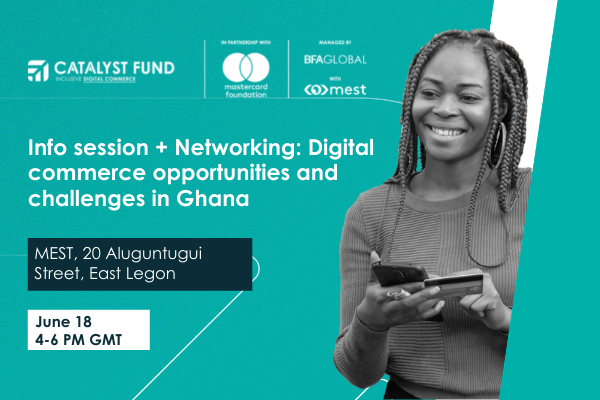
IN PARTNERSHIP WITH


Good morning ☀️ ️
Yesterday, we unveiled our new website with features like dark mode and easy navigation for all our exciting flagships!
Wanna check it out? Start here.
In today’s edition:
- My Life in Tech
- Kenyan-based Mazi Mobility launches electric motorcycle fleet
- Netflix kicks off inaugural skills development initiatives in Africa
- Ask an Investor
- Europe’s most valuable startup
Haifa Ben Salem’s work at the International Trade Centre is shining a light on less popular African tech markets

When Microsoft released the first version of the Windows 98 operating system, Haifa was about six years old and living with her parents in the capital city of Tunis in Tunisia.
There was a running theme in her home where she was called the ‘engineer of the house’. It wasn’t particularly because she loved tinkering with her computer, simply being able to print things with her computer was enough to earn her the title.
Like many curious children, Haifa’s affinity for technology was perhaps the beginning of that story. But it would take a detour when the time came for her to go to university.
“I mean, they wanted me to be a lawyer. I tried law school, but I did not like it.”
She ended up studying political science at the University of Geneva and following her graduation, she took on a role at an NGO focused on trading sustainability.
In this week’s edition of My Life in Tech, Edwin talks to Haifa Ben Salem whose work at the International Trade Centre is shining a light on less popular African tech markets.
Increase your online sales with a Paystack Storefront – a free, beautiful seller page that helps you bring creative ideas to life.
🏾 Learn more at paystack.com/storefrontKenyan-based Mazi Mobility launches electric motorcycle fleet

Mazi Mobility, a mobility-as-a-service (Maas) startup founded by Jesse Forrester, recently launched its flagship electric motorcycle fleet in Nairobi, Kenya. Mazi Mobility is backed by global Venture Builder, Satgana.
Mazi uses motorcycles, locally known as ‘bodas’, to accelerate the transition to efficient, affordable and clean transport in the city. The startup also introduced battery swapping stations that provide on-demand energy, reducing transportation costs by 50%. A particular bike model (MK3) offers a choice between a single and dual battery, capable of up to 70km and 140km of range, respectively.
They are working with boda operators, technical institutions and manufacturers to ensure the successful implementation of their service.
Read more: Kenyan-based Mazi Mobility launches electric motorcycle fleet backed by Venture Builder Satgana
Netflix kicks off inaugural skills development initiatives in Africa

Netflix on Sunday, June 13, commenced its first 3-month Episodic Lab (EPL) and Development Executive Traineeship (DET) programmes in Africa. An inaugural development lab for African writers.
Out of over 500 applications received from Nigeria, Kenya, Mozambique, South Africa and Zimbabwe for training, only twelve professionals were selected to take part in both training sessions.
The lab participants will receive about $2,000 monthly stipend to enable them to focus entirely on their training, which will run remotely till September 5, 2021.
Why it matters: The Netflix programme is being held to strengthen the foundation of quality storytelling in Africa and is part of efforts by the global streaming giant to produce more original local content from creative writers on the continent.
Read more: Netflix kicks off inaugural skills development initiatives in Africa
Accra, Ghana: Do you have a digital commerce company in Ghana? Learn more about the Catalyst Fund Inclusive Digital Commerce Accelerator, and meet the team along with portfolio company founders from KudiGo & Boost Ghana, followed by cocktails & networking with investors, startups, & ecosystem leaders in digital commerce. RSVP here.
Unconventional Capital is living up to its name with its algorithm-backed investments

Here’s how early-stage investment mostly happens: An investor and an ambitious entrepreneur get talking. After a few background checks and business plan conversations, the investor decides whether to invest. But not before checking their gut feeling. Along the way the investor is constantly asking, “Does this feel right?”
In 2018, Franziska Reh and her co-founder felt this investment process wasn’t right. If this was the conventional way people made investment decisions, what would an unconventional approach look like? They started working on a way to revolutionise access to funding for entrepreneurs using technology.
The result: Unconventional Capital (Uncap), a fintech company that invests in early-stage African companies. At Uncap no team member makes investment decisions. The selection process is based on an algorithm that focuses very much on the potential of the entrepreneur.
Reh told me, “If we’re completely honest, it’s not that VCs and others are so great at that [investing without bias]. Many of them are still hugely underperforming and even there nine out of 10 startups fail. You could even argue that this gut feeling does not even work that well.”
In this edition of Ask an Investor, I share the story of Unconventional Capital, a company challenging the traditional way early stage investing is being done.
Europe’s most valuable startup

Europe’s most valuable startup
Last week, European fintech giant Klarna announced that it raised $639 million at a staggering valuation of $45.6 billion. This valuation is 4 times what it was just 8 months ago. The round was led by SoftBank’s Vision Fund 2.
The 16 year old Swedish fintech company is most popular for its buy-now-pay-later service amongst other online financial services it offers.
How’s Klarna doing?
- More than 18 million American consumers now use Klarna. That’s up from 10 million at the end of last year’s third quarter, and up 118% year over year.
- It has more than 90 million global active users and processes more than 2 million daily transactions.
- In 2020, Klarna processed $50 billion worth of transactions, three times more than what its close competitor Afterpay projected for 2021. In the first quarter of this year it processed $18.1 billion in volume compared to $9.9 billion in the prior-year first quarter.
Zoom out: With its current momentum, there’s rumour that Klarna may be preparing to go public within the year. Meanwhile, there’s some criticism that Klarna’s positioning as an alternative to credit cards is manipulative – it encourages overspending and can potentially ruin customers’ credit histories if they fail to keep up on payments.
Event
On June 22nd-24th, Digital Africa will hold the 9th edition of its annual Conference and Exhibition.
Why should you attend?
The three-day event will bring together thousands of tech professionals and enthusiasts to learn, network and discuss the progress of tech in Africa.
If your work is tied to Africa’s tech industry, whether as an innovator, policymaker, investor, academic institution, media, or even if you’re just curious, then you should join this conference.
This time around, it’s fully virtual and there’ll be many insightful sessions where panelists will discuss interesting topics including Artificial Intelligence, 5G, Blockchain, Internet of Things, Smart Cities, and many more.
Register here to attend for free.






















